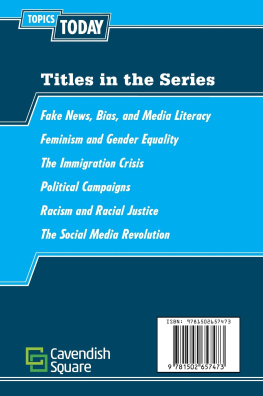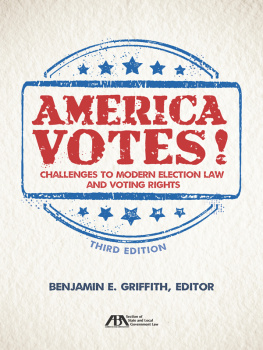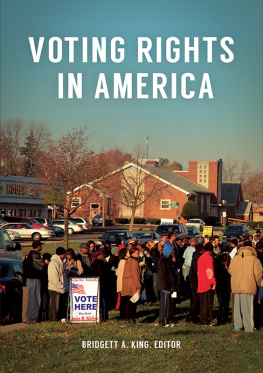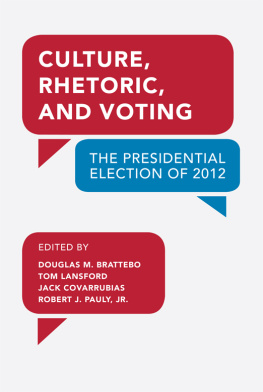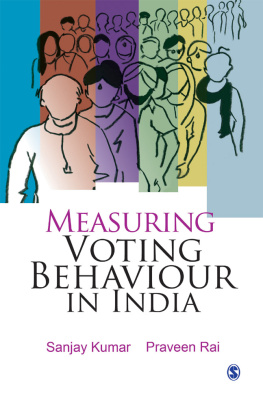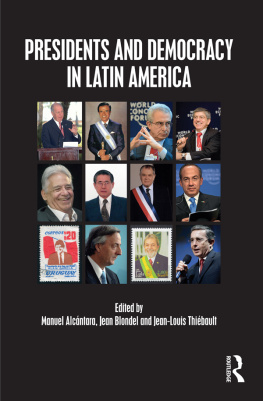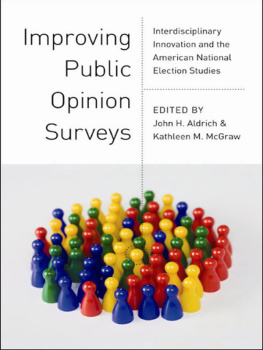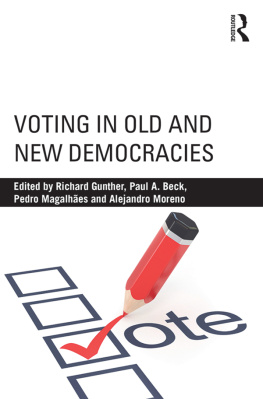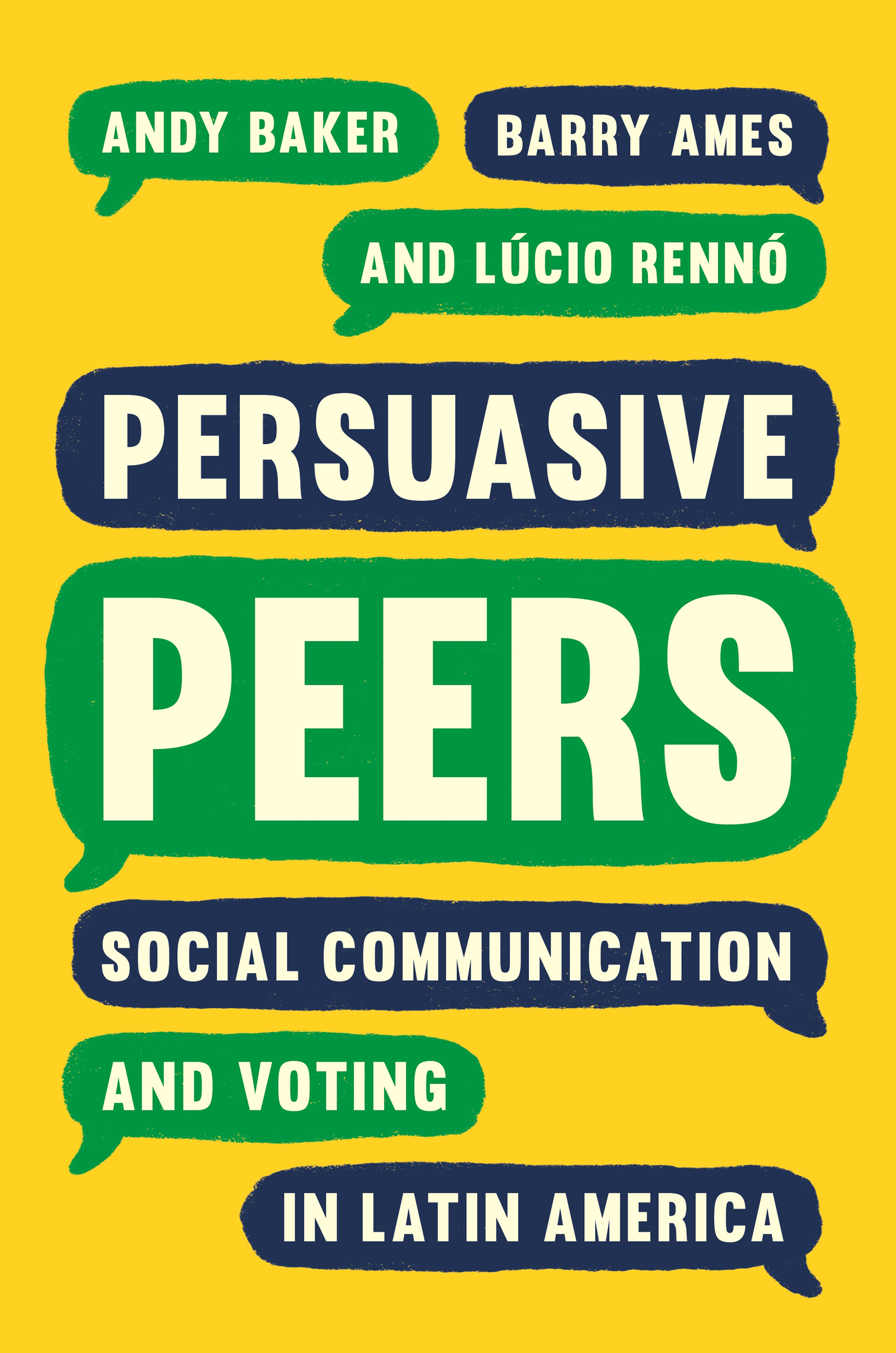Persuasive Peers
PRINCETON STUDIES IN GLOBAL AND COMPARATIVE SOCIOLOGY
Andreas Wimmer, Series Editor
Persuasive Peers: Social Communication and Voting in Latin America, Andy Baker, Barry Ames, and Lcio Renn
Give and Take: Developmental Foreign Aid and the Pharmaceutical Industry in East Africa, Nitsan Chorev
Citizenship 2.0: Dual Nationality as a Global Asset, Yossi Harpaz
Nation Building: Why Some Countries Come Together While Others Fall Apart, Andreas Wimmer
The Paradox of Vulnerability: States, Nationalism, and the Financial Crisis, John L. Campbell and John A. Hall
Persuasive Peers
SOCIALCOMMUNICATIONVOTINGLATIAMERICA
Andy Baker, Barry Ames, & Lcio Renn
PRINCETON UNIVERSITY PRESS
PRINCETON AND OXFORD
Copyright 2020 by Princeton University Press
Requests for permission to reproduce material from this work should be sent to
Published by Princeton University Press
41 William Street, Princeton, New Jersey 08540
6 Oxford Street, Woodstock, Oxfordshire OX20 1TR
press.princeton.edu
All Rights Reserved
Library of Congress Cataloging-in-Publication Data
Names: Baker, Andy, 1972 author. | Ames, Barry, author. | Renn, Lucio R., author.
Title: Persuasive peers : social communication and voting in Latin America / Andy Baker, Barry Ames, and Lucio Renno.
Description: Princeton : Princeton University Press, [2020] | Series: Princeton studies in global and comparative sociology | Includes bibliographical references and index.
Identifiers: LCCN 2019056822 (print) | LCCN 2019056823 (ebook) | ISBN 9780691205786 (hardback) | ISBN 9780691205779 (paperback) | ISBN 9780691205793 (ebook)
Subjects: LCSH: VotingLatin America. | CommunicationPolitical aspectsLatin America. | Social networksPolitical aspectsLatin America. | Social influencePolitical aspectsLatin America. | Political participationLatin America. | Latin AmericaPolitics and government.
Classification: LCC JL968 .B24 2020 (print) | LCC JL968 (ebook) | DDC 324.98dc23
LC record available at https://lccn.loc.gov/2019056822
LC ebook record available at https://lccn.loc.gov/2019056823
Version 1.0
British Library Cataloging-in-Publication Data is available
Editorial: Meagan Levinson and Jacqueline Delaney
Production Editorial: Lauren Lepow
Text Design: Lorraine Doneker
Cover Design: Karl Spurzem
Production: Brigid Ackerman
Publicity: Kate Hensley and Kathryn Stevens
Para nossos filhos, Della, Olivia, Elisa, Toms e Celina
CONTENTS
- ix
- xiii
- xvii
- xix
- xxiii
ILLUSTRATIONS
. The Evolution of Vote Intentions for Major Presidential Candidates in Brazil 2014
. Evas Network through Time
. The Effect of Political Geography on Evas Mid-campaign Network
. Evas Mid-campaign Network Expanded
. Sociograms of Two Egocentric Networks
. The Frequency of Political Discussion in 121 Country Years
. The Frequency of Political Discussion in 33 Election Campaigns
. The Number of Political Discussants in Brazil, Mexico, and the US
. The Amount of Political Discussion and TV News Consumption in Mexico 2006
. Campaign Knowledge by Exposure to Political Intermediaries in Mexico 2006: Coefficients from Three OLS Models
. Political Knowledge among Egos and Alters in Brazil 2002
. Selection of a Social Alter to Be a Political Alter by the Perceived Political Knowledge of That Alter in Four Latin American Countries: Predicted Changes in Probability from Three Binary Logit Models
. The Distribution of Political Agreement and Disagreement with Ego in Egocentric Networks in Brazil and Mexico
. Rates of Political Agreement within Discussion Dyads in 29 Election Years in 18 Countries
. The Propensity of Respondents to See Political Bias in Their Political Intermediaries in 34 Election Years in 20 Countries
. Rates of Voter Preference Change among Twice-Opinionated Respondents during Brazilian, Mexican, and Argentine Presidential Campaigns
. Rates of Voter Preference Stability among Once- and Twice-Opinionated Respondents during Brazilian, Mexican, and Argentine Presidential Campaigns
. The Evolution of Vote Intentions for Major Presidential Candidates in Brazil 2002
. The Evolution of Vote Intentions for Major Presidential Candidates in Brazil 2006
. The Evolution of Vote Intentions for Major Presidential Candidates in Brazil 2014
. The Evolution of Vote Intentions for Major Presidential Candidates in Mexico 2006
. Political Agreement and Disagreement in Three Egocentric Networks
. Political Heterogeneity in Two Egocentric Networks
. The Likelihood of Changing Vote Preference between Campaign and Election Waves by Campaign-Wave Network Traits: Predicted Probabilities from Four Binary Logit Models
. Changed Vote Preference by Network Traits in Brazil and Mexico: Coefficients from Four Binary Logit Models
. Egos Vote Choice (Y e ) by Alters Vote Choice at the Dyadic Level in Brazil and Mexico: Coefficients from Four Multinomial Logit Models
. Egos Vote Choice (Y e ) by Alters Vote Intention at the Dyadic Level in Brazil and Mexico (Stable Alters Only): Coefficients from Four Multinomial Logit Models
. Egos Runoff Vote Choice by Alters First-Round Vote Choice in Brazil: Predicted Changes in Probability from Three Models
. Rates of Preference Change by Network Disagreement at the Candidate Level in Brazil 2002, 2006, 2014, and Mexico 2006
. Preference Stability by Degree of Political Knowledge in Brazil and Mexico: Model Predictions
. The Degree of Exposure to Media among Ciro Supporters and Ciro Voters by Source and Timing in Brazil 2002
. The Distribution of Discussants by Relationship Type and Neighborhood Coresidency Status in Brazil 2002
. Feeling Thermometer Scores for the Opposing Party and for Two Leftist Movements by City in Brazil 2002
. The PTs Two-Party Vote Share in 1998 Executive Elections by Neighborhood in Caxias do Sul and Juiz de Fora
. The PTs Two-Party Vote Share in 2000 Mayoral Elections by Neighborhood in Caxias do Sul and Juiz de Fora
. Income Levels by Neighborhood in Caxias do Sul and Juiz de Fora in 2002
. The Distribution of Vote Intentions among Alters by Neighborhood Type and City in Brazil 2002: Predicted Percentages from Two Fractional Multinomial Logit Models
. Brazilian Regions and Counties by Human Development Index in 2010
. Brazils Political Realignment: PT Vote Share minus PSDB Vote Share by County in 2002 and 2006
. Brazils Regional Political Cleavage: PT Vote Share minus PSDB Vote Share by County in 2014
. Mexican States and Counties by Human Development Index in 2010
. Mexicos Regional Political Cleavage: PAN Vote Share minus PRD Vote Share by Congressional District in 2006
. The Distribution of Vote Intentions among Alters by State in Brazil 2014: Predicted Percentages from a Fractional Multinomial Logit Model
. The Distribution of Vote Intentions among Alters by State in Mexico 2006: Predicted Percentages from a Fractional Multinomial Logit Model
. Sociograms for Two Different Conceptualizations of Clientelism
. Persuasion Frequency among Targets and Non-targets in 22 Latin American Countries
. Clientelistic Targeting by Persuasion Frequency in 22 Latin American Countries in 2010: Results from Two Binary Logit Models


